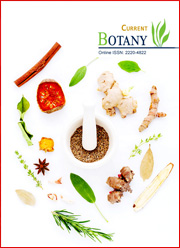In Vitro Assessment of Antisecretory Activity of Root Extracts of Acacia arabica Lam.Willd against Biodiversity of E. coli Isolated from Bhilai- Durg Region
Abstract
This study has been done to assess antisecretory activity of methanolic and acetone root extracts of Acacia arabica Lam. Willd against diarrheagenic clinical, veterinary, environmental and standard isolates of E. coli. In addition the present study was also undertaken to evaluate MIC of two different plant extracts against test organism as well as to investigate effect of interaction between plant extracts with antibiotics Ampicillin and Penicillin G against test organisms. Determination of antibacterial activity of methanolic and acetone plant extracts and synergism/ antagonism with various drugs were performed by well-diffusion method. MIC of plant extracts were evaluated by broth microdilution method. Methanolic extract was found to be effective against all isolates of E. coli  were as acetone extract was found to be effective against four isolates and ineffective against clinical strain of E. coli. MIC of methanolic root extract was found to be 0.6 mg/ml for EC (1), EC(3),EC(4) and E. coli MTCC 723 and 0.3 mg/ml for EC(2). MIC of acetone root extract for EC(1) was 2.5 mg/ml and 0.6 mg/ml for EC(2),EC(3),EC(4) and E. coli MTCC 723. In combination with Ampicillin and methanolic root two cases of synergism were recorded were as antagonism were observed in three different isolates. Synergism was also reported in three different strains of E.coli in combination with methanolc root extract and Penicillin G. Additive activity was also observed in case of combined activity of acetone extract with Penicillin G (in two isolates) and Ampicillin (in 3 isolates) of E. coli. It is therefore concluded that additive / synergistic effect produced by combination between plant extracts and antibiotics offered an alternative therapy to cure diarrhea caused by MDR- E.coli more effectively.





 .
.